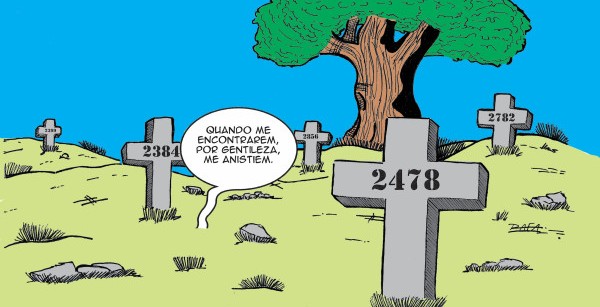UNDER THE WINDOW: OURO PRETO
(For Lilli Correia de Araújo)
The conversations are simple: about food,
or, “When my mother combs my hair, it hurts.”
“Women.” “Women!” Women in red dresses
and plastic sandals, carrying their almost
invisible babies – muffled to the eyes
in all the heat – unwrap them, lower them,
and give them drinks of water lovingly
from dirty hands, here where there used to be
a fountain, here where all the world still stops.
The water used to run out of the mouths
of three green soapstone faces (One face laughed
and one face cried; the middle one just looked.
Patched up with plaster, they’re in the museum.)
It runs now from a single iron pipe,
a strong and ropy stream. “Cold.” “Cold as ice,”
all have agreed for several centuries,
Donkeys agree, and dogs, and the neat little
bottle-green swallows dare to dip and taste.
Here comes that old man with the stick and sack,
meandering again. He stops and fumbles.
He finally gets out his enameled mug.
Here comes some laundry tied up in a sheet,
all on its own, three feet above the ground.
Oh, no – a small black boy is underneath.
Six donkeys come behind their “godmother”
– the one who wears a fringe of orange wool
with wooly balls above her eyes, and bells.
They veer toward the water as a matter
of course, until the drover’s mare trots up,
her whiplash-blinded eye on the off side.
A big new truck, Mercedes-Benz, arrives
to overawe them all. The body’s painted
with throbbing rosebuds and the bumper says
HERE I AM FOR WHOM YOU HAVE BEEN WAITING
The driver and assistant driver wash
their faces, necks, and chests. They wash their feet,
their shoes, and put them back again.
Meanwhile, another, older truck grinds up
in a blue cloud of burning oil. It has
a syphilitic nose. Nevertheless,
its gallant driver tells the passerby
NOT MUCH MONEY BUT IT IS AMUSING.
“She’s been in labor now two days.” “Transistors
cost much too much.” “For lunch we took advantage
of the poor duck the dog decapitated.”
How talkative are the seven ages of man,
how soiled and thirsty!
Oil has seeped into
the margins of the ditch of standing water
and flashes or looks upwards brokenly,
like bits of mirror – no, more blue than that:
like tatters of the Morpho butterfly.
– ELIZABETH BISHOP
Publicado, pela primeira vez, em 24 de dezembro de 1966 na Revista The New Yorker. “Under the window” aparece também em “The Complete Poems” – antologia poética de Bishop de 1969, editado pela Farrar, Straus and Giroux.



Um comentário sobre “[Extras] UNDER THE WINDOW: OURO PRETO”